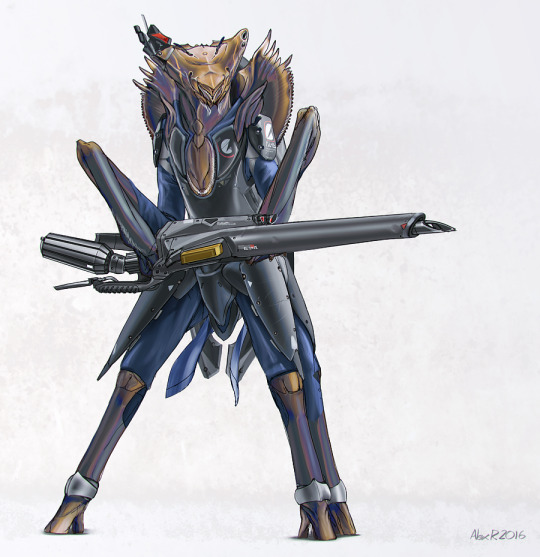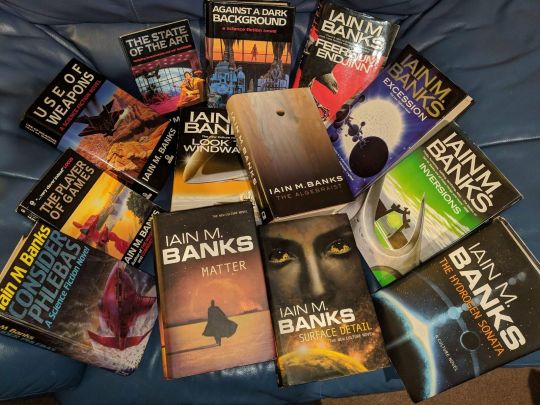#idiran
Explore tagged Tumblr posts
Text

An illustration of a young Idiran soldier from the Culture series; part of a private commission.
487 notes
·
View notes
Text






On February 16th 1954 the writer Iain Banks was born in Dunfermline, Fife
Banks was a son of a professional ice skater and an Admiralty officer. He spent his early years in North Queensferry and later moved to Gourock because of his father’s work requirement. He received his early education from Gourock and Greenock High Schools and at the young age of eleven, he decided to pursue a career in writing. He penned his first novel, titled The Hungarian Lift-Jet, in his adolescence. He was then enrolled at the University of Stirling where he studied English, philosophy and psychology. During his freshman year, he wrote his second novel, TTR.
Subsequent to attaining his bachelor degree, Banks worked a succession of jobs that allowed him some free time to write. The assortment of employments supported him financially throughout his twenties. He even managed to travel through Europe, North America and Scandinavia during which he was employed as an analyzer for IBM, a technician and a costing clerk in a London law firm. At the age of thirty he finally had his big break as he published his debut novel, The Wasp Factory, in 1984, henceforth he embraced full-time writing. It is considered to be one of the most inspiring teenage novels. The instant success of the book restored his confidence as a writer and that’s when he took up science fiction writing.
In 1987, he published his first sci-fi novel, Consider Phlebas which is a space opera. The title is inspired by one of the lines in T.S Eliot’s classic poem, The Waste Land. The novel is set in a fictional interstellar anarchist-socialist utopian society, named the Culture. The focus of the book is the ongoing war between Culture and Idiran Empire which the author manifests through the microcosm conflicts. The protagonist, Bora Horza Gobuchul, unlike other stereotypical heroes is portrayed as a morally ambiguous individual, who appeals to the readers. Additionally, the grand scenery and use of variety of literary devices add up to the extremely well reception of the book. Its sequel, The Player of Games, came out the very next year which paved way for other seven volumes in The Culture series.
Besides the Culture series, Banks wrote several stand-alone novels. Some of them were adapted for television, radio and theatre. BBC television adapted his novel, The Crow Road (1992), and BBC Radio 4 broadcasted Espedair Street. The literary influences on his works include Isaac Asimov, Dan Simmons, Arthur C. Clarke, and M. John Harrison. He was featured in a television documentary, The Strange Worlds of Iain Banks South Bank Show, which discussed his literary writings. In 2003, he published a non-fiction book, Raw Spirit, which is a travelogue of Scotland. Banks last novel, titled The Quarry, appeared posthumously. He also penned a collection of poetry but could not publish it in his lifetime. It is expected to be released in 2015. He was awarded multitude of titles and accolades in honour of his contribution to literature. Some of these accolades include British Science Fiction Association Award, Arthur C. Clarke Award, Locus Poll Award, Prometheus Award and Hugo Award.
Iain Banks was diagnosed with terminal cancer of the gallbladder and died at the age of 59 in the summer of 2013.
341 notes
·
View notes
Text
So far I like the start of "Consider Phlebas"
The viewpoint side is the one most sci fi story would see as protag, who are heavily reliant on machine and technology.
"They’re on the side of life - boring, old-fashioned, biological life; smelly, fallible and short-sighted, God knows, but real life."
They're the proud warrior race, the ones with a code of honor and all this, and who rely on less powerful tech because they are more skilled.
But thiss "They're on the side of life" argument is already broken appart by the time of this discussion : They are perfectly willing to destroy whole cities after already succeeding a rescue mission. They have slaves.
The Idirans want to exploit life and force it into submission. But to someone who buy into the idea of "essence" and the machismo infused idea of life, it's "being on the side of life". It's destroying something to protect the idea of it.
Meanwhile the only seen member of the culture so far negotiate to have an ennemy spared by an allied power, and their critic of the idirans is about their expansionist mindset. They are the ones actually trying to preserve life.
6 notes
·
View notes
Text
Speaking of people whose real sehnsucht is for 70s television, but who dress it up as something else, consider Iain Banks.
His dates are 1953 -- 2013. The crucial date of publication for this poat is 1987: that of Consider Phlebas, a reworking of a story from the early 80s.
The Culture is a sort of ultra-ultra-liberal, bigger, "later" Federation of Planets, which in contrast is merely ultra-liberal. Now, Star Trek, certainly in Britain, is a 70s phenomenon, premiering in 1969 -- that is, when Banks was 16.
Banks was an SF fan so it is a little simplified to reduce it to this -- this is the era of the New Wave after all -- but the 20th century really was a boring time. It is easy to retroject Internet-era ferment back too much, and besides, the Culture itself is the Federation++, and not all his stories are Culture stories. Even his Culture stories aren't Culture stories. They're mostly about awful reactionary aliens.
Take the Idiran War. As well as being a standin for the Second World War, Vietnam, and the fundamentalist revolutions of 1979, the Idiran War serves this purpose: we are told that at various points in the past, Culture citizens exercised all the ultra-ultra-ultra-liberal transhumanist fantasies of what we would now call something like "total morphological freedom" -- people turning themselves into giant penises or gas clouds, living forever etc. The Culture we encounter in the books is however quite reactionary -- people appear as "humanoids" with about as much diversity as in Star Trek, have little ambition, expect to die after a few centuries and join Starfleet Contact if they are aggrandisers.
It's strongly implied, if not stated, that the thrice-ultra-liberals, who were interested in "total morphological freedom" peeled off from the Culture before the War, explaining why the Culture appears merely ultra-liberal, and that this has led to a sort of lasting cultural stagnation, lifted by the appearance of a particularly Tory kind of alien, or a geometric impossibility -- that is, like Star Trek with a wild backstory you never see.
By the standards of actually existing liberalism, especially in the 20th century, it remains an exhilarating place to imagine oneself in, but by the standards of the "worldbuilding" - which for a certain kind of mind takes up far too much importance - it is a remarkably reactionary setting.
In particular, it is interesting that there is no strong iconography attaching to the Culture -- Banks had no interest in attaching one to his writings, and seems to have taken a purely literary view of it, but fans have felt no desire to develop one around it, and the Culture is one of those SF properties that visual media developers founder upon. I claim that one reason for this is that, once you pull away the thrice-ultra liberal "worldbuilding" stuff, the iconography, insofar as Banks had any, would be essentially that of Star Trek, perhaps inflected through British SF television in general -- which is to say, Doctor Who, Blakes 7 and so on. Rather sparse sets, painted backdrops, *that* kind of costuming, blocky robots whose emotions are all glowing auras... Distinctly ""hauntological"", which is why nobody dare develop it.
3 notes
·
View notes
Note
doesn't The Culture begin with a man who is being executed by being drowned in shit?Or is that a different Culture
Consider Phlebas does indeed begin with a scene where the protagonist is about to be executed by being drowned in shit, but he's not part of the Culture (he is in fact fighting for the Idirans against them), and the people trying to execute him are not part of the Culture either.
3 notes
·
View notes
Text
Another good one is from the Culture series by Ian M. Banks. Specifically the Idiran-Culture war. To quote:

A war that killed 850 billion people and destroyed 6 stars is considered small, short and just mildly interesting.
Most sci fi/fantasy: this civil war has been waged for a thousand years. These great houses have ruled the realm for eight thousand years. These two families have been feuding for ten thousand years. This single political institution has stood for twenty-five thousand years.
Animorphs: there is a war waged across the galaxy, waged by countless species. Entire planets have been conquered, entire species have been enslaved. Multiple genocides have been committed, even by the "good guys." It's been going on about, oh, thirty-two years now.
9K notes
·
View notes
Text
REVIEW: Culture, #1: Consider Phlebas by Iain M. Banks

Summary (Provided by Goodreads)
The war raged across the galaxy. Billions had died, billions more were doomed. Moons, planets, the very stars themselves, faced destruction, cold-blooded, brutal, and worse, random. The Idirans fought for their Faith; the Culture for its moral right to exist. Principles were at stake. There could be no surrender.
Within the cosmic conflict, an individual crusade. Deep within a fabled labyrinth on a barren world, a Planet of the Dead proscribed to mortals, lay a fugitive Mind. Both the Culture and the Idirans sought it. It was the fate of Horza, the Changer, and his motley crew of unpredictable mercenaries, human and machine, actually to find it, and with it their own destruction.
MY REVIEW: Did Not Finish
Okay honestly, I've had it with this book. I got to 48%, and I literally do not care about a single character, so I'm not finishing it. Events seem random and have little meaning, I have no idea where the plot is going, and it's unnecessarily violent. So yeah, didn't really like this one and there were so many scenes that seemed absolutely pointless.
Really unfortunate because I did enjoy the writing itself and the sci-fi aspects.
#Consider Phlebas#Culture#iain m. banks#book review#books#book reviews#science fiction#Dnf#Did not finish#0 stars
0 notes
Text




On February 16th 1954 the writer Iain Menzies Banks was born in Dunfermline, Fife.
Banks was a son of a professional ice skater and an Admiralty officer. He spent his early years in North Queensferry and later moved to Gourock because of his father’s work requirement.
He received his early education from Gourock and Greenock High Schools and at the young age of eleven, he decided to pursue a career in writing. Iain penned his first novel, titled The Hungarian Lift-Jet, in his adolescence. He was then enrolled at the University of Stirling where he studied English, philosophy and psychology. During his freshman year, he wrote his second novel, TTR.
Subsequent to attaining his bachelor degree, Banks worked a succession of jobs that allowed him some free time to write. The assortment of employments supported him financially throughout his twenties. He even managed to travel through Europe, North America and Scandinavia during which he was employed as an analyzer for IBM, a technician and a costing clerk in a London law firm. At the age of thirty he finally had his big break as he published his debut novel, The Wasp Factory, in 1984, henceforth he embraced full-time writing. It is considered to be one of the most inspiring teenage novels. The instant success of the book restored his confidence as a writer and that’s when he took up science fiction writing.
In 1987, he published his first sci-fi novel, Consider Phlebas which is a space opera. The title is inspired by one of the lines in T.S Eliot’s classic poem, The Waste Land. The novel is set in a fictional interstellar anarchist-socialist utopian society, named the Culture. The focus of the book is the ongoing war between Culture and Idiran Empire which the author manifests through the microcosm conflicts. The protagonist, Bora Horza Gobuchul, unlike other stereotypical heroes is portrayed as a morally ambiguous individual, who appeals to the readers. Additionally, the grand scenery and use of variety of literary devices add up to the extremely well reception of the book. Its sequel, The Player of Games, came out the very next year which paved way for other seven volumes in The Culture series.
Besides the Culture series, Banks wrote several stand-alone novels. Some of them were adapted for television, radio and theatre. BBC television adapted his novel, The Crow Road (1992), and BBC Radio 4 broadcasted Espedair Street (1987). The literary influences on his works include Isaac Asimov, Dan Simmons, Arthur C. Clarke, and M. John Harrison. He was featured in a television documentary, The Strange Worlds of Iain Banks South Bank Show (1997), which discussed his literary writings. In 2003, he published a non-fiction book, Raw Spirit, which is a travelogue of Scotland. Banks last novel, titled The Quarry, appeared posthumously. He also penned a collection of poetry but could not publish it in his lifetime. It is expected to be released in 2015. He was awarded multitude of titles and accolades in honor of his contribution to literature.
Some of these accolades include British Science Fiction Association Award, Arthur C. Clarke Award, Locus Poll Award, Prometheus Award and Hugo Award. Iain Banks was diagnosed with terminal cancer of the gallbladder and died at the age of 59 in the summer of 2013.'
12 notes
·
View notes
Text

took a pass at drawing an idiran from iain m banks consider phlebas - wc williams
8 notes
·
View notes
Text
I sure hope you didn't join it on the side of the Idirans
joining the culture war on the side of culture
#shitposting (not foone)#i'm not spoiling it#i love the whole world the future's really cool#found on dashboard
219 notes
·
View notes
Text
Fan wank - Sense of scale
So yes. Some folks venture into the fanfictiony side of things because they feel a connection to this or that character, or would like to just imagine this or that scene concerning this or that character and how they might relate to that or this character.
Also fucking.
Personally, I just like taking two entirely different universes that run on different rules and have different scales and then just mashing them together and letting my mind work on how that might shake out.
All of which is a long way of saying I’ve been daydreaming about some sort of Mass Effect/Culture crossover.
Mean, I already did one, but I mean like a proper one. Or at least one that could get into how laughably pitiful the Reaper War would actually be in a Culture context.
Let’s think about it.
In the context of Mass Effect the Reaper War is, understandably, kind of a nightmare. Not only has technological development been entirely shaped by the bad guys - meaning they know basically everything you might be able to do, and can also do it better - but they also just infiltrate and subvert your own ranks, steal secrets, track you down without mercy, have no supply lines, make troops out of your own civilians yada yada. It’s like the Scourge but in space.
Oh, and also there’s fucking thousands of the bastards. Like, there’s no hard numbers available that I know of, but estimates I’ve heard of (based on the maths involving how many years they’ve been active, species harvested, cycles, yada yada) put the number of Reapers at around 20,000, give or take.
That’s fucking INSANE in the context of Mass Effect.
We never get a proper in-depth examination of ship-to-ship engagements in the games. We get some real juicy Codex entries (which I’ve devoured) but anytime you actually SEE ships fighting it’s generally a case of “And now these friendly ships will explode for the sake of drama”, which is unhelpful.
Seriously, what the hell happens at the Battle of the Citadel in the first game? A bunch of Geth ships show up and fire...missiles? Torpedoes? They move too slow for accelerator rounds, whatever they are. And they hit the Turian ships just hanging around the Citadel and the Turian ships blow up IMMEDIATELY.
I mean, the basic assumption - which is what the Codex conveys - of ship combat in Mass Effect is that most hits get tanked on barriers and once those drop it’s basically open season, but what we SEE is ships just blowing up.
ALSO - and this is me just being salty - would people STOP assuming that ALL ship guns in Mass Effect are super-powerful as the Dreadnought’s main gun. They’re not! The spinal gun on a cruiser ain’t no joke but most of the firepower is going to be broadside gun, from the sound of things.
Hell! A Turian ship shows up in one ME3 cutscenes and starts firing all SORTS of tiny guns all along it’s little wings - nary a spinal gun shot fired! Expand your minds!
Anyway, I’m drifting away from the main point here.
Even assuming only, say, ten percet of that 20,000 number is the big ol’ Sovereign Class ones that still makes it two thousand ships that can kick the shit out of any Dreadnought in the galaxy. Oh, and - being generous - there’s only like two hundred or Dreadnoughts in the galaxy at all. And that’s being generous, like I say. It’s less than that.
And, as said, Reapers can do it all better. Dreadoughts are excplitly the biggest, toughest ships that the races in Mass Effect can make, and the big Reaper ships shit all over them, basically. Outrange, outgun, outlast, just everything; better, better, better.
Also, sidenote and speculation, but I always figured - since it turns out that the Reapers built the Mass Relays and stuff and they’re basically indestructible because they got quantum shielding or some shit, I always figured that the big Reapers (the Sovereign class boys) had a variant of that they could turn on in dire straits, thus explaining their ridiculous durability.
Mean, they had, like, crazy barriers, ludicrous armour and THEN this thing they could turn on if things got really bad. Probably barrier thought. I base this on how Sovereign was tanking all that fire in the first game until he basically got distracted, whereupon weapons started hitting hull, which didn’t last that long.
I’m probably wrong. But that’s my idea, damnit!
But yes. Reapers. Hard bastards. And lots of them.
Twenty thousand! And they know where you live! And they have the keys to your house! And they turned all your friends into drooling cyber-zombies!
So yeah, that’s bad.
PS: Mad props to the Protheans. Given that that guy in Mass Effects are getting rolled up like a carpet in what looks to be a few months and the Protheans held on for a hundred years or more, you really got to hand it to them.
Suppose that’s the benefit of being a big ol’ empire. Even with your heart ripped out (the Citadel getting taken) you’re still coherent and big enough to push back, even if you lose. Mass Effect guys are all over the shop, and it shows.
But then you got the Culture.
The major war that gets mentioned in the Culture books is the Idiran-Culture war. This war took about forty eight years, caused somewhere in the region of 850 billion deaths and destroyed roughly 90 million ships, though maybe closer to 91 - I can’t remember the exact number. But let’s go with 90, eh?
NINETY. FUCKING. MILLION. SHIPS.
Even over forty eight years that still works out to 1,875,000 ships a year! You could lose the Reapers AND everyone else in that! In one year!
And bear in mind your average GCU (of which there are about ten million kicking about the galaxy, apparently) can:
- Destroy a planet, if it feels like it - Make other ships - Go a few hundred times the speed of light - Displace an anitmatter warhead around or even into your ship from, oh, lightyears away? - Has fucking lasers - Has forcefields that can cut shit in half from, again, lightyears away. - Can just use Effectors to turn your ship off. Or, more likely, take control of all your ships and make them blow each other up - And Gridfire. The weaponry of the end of the universe.
Never sure on the ranges, really. Culture books are pretty vague. But all of these things get mentioned. Gridfire especially can take out an orbital, which is ludicrous.
Mean, an orbital’s got to be made of some exotic shit to be able to exist at all so, really, Gridfire could probably put a dent in something like the Citadel, I’d reckon.
He said, about stuff that doesn’t exist.
Makes sense though, doesn’t it?
Bah. It’s all waffle. This was mainly just something to keep me sane on my walk home.
But you can kind of see how these two sides don’t stack up, right?
Because they’re playing by different rules! And that’s delightful.
In conclusion: I’m a huge, frothing nerd who has no idea what he’s talking about but damn, spaceships, son.
3 notes
·
View notes
Text
from @power-chords
Time: 5:42PM PST. Pacific Time Zone: Gods' True Time Zone
Relationship status: Single. Extremely single. '90s X-Games level extreme. To the max. Gnarly single, bruh.
Favourite colour: Sea-foam green. Guitar, nails, shoes. It's A Thing now and it makes me very happy. There's cracks in the the ol' goth facade.
Song stuck in my head: Well, it wasn't “Banditos” but it is now and I'm thinking about driving from Middletown to Christiana mall in August 1997 and worrying a little that if we get in an accident the passenger side airbag will go off and send my girlfriend's legs that have been resting on the dash into the back seat minus the entire rest of her.
Last thing I googled: iykyk
Dream trip: The Culture discover earth. "Yo, we fixed all your shit and you can go to Andromeda now. An Idiran ate Kissinger. Enjoy."
Something I want right now: A friend who's a capricious minded Mind in control of a GSV: Causing Problems On Purpose
0 notes
Text
I have posted about this elsewhere but the Culture at the time of the books is in an extremely reactionary and aristocratic phase -- which is to say, since the Culture does not exist outside of the stories, the Culture books are reactionary stories.
The concept of being "pan-humanoid" is central to the identity of the Culture -- but think about what this means. It is EXTREMELY morphologically restrictive. If you are not one head (two eyes, two ears, one nose, one mouth) two arms, two legs, genitals in the middle (two sexes) some hair, you are excluded from being in the meat part of the Culture. And this is not a Star Trek galaxy where everyone is humanoid.
Why might this be? Well, it's strongly implied that before the Idiran War things were much merrier. People were much more morphologically free, and did live as animals or tentacle bushes or nanoclouds or whatever and aspired for immortality but this stopped. I think it is very significant that the Idirans are tripods, and so it seems fitting that bipedalism should become chauvinstically a Culture trait. It's also telling how many of the "Nazi of the week" species aren't humanoid -- the Affront for instance are literal ultra-Tory gasbags. The Azadians are marginal, with the trisexual thing being an intriguing anomaly that leads inevitably to fascism, rather than part of panhumanoid variation.
The other thing about the Culture books is that they are stories about the warrior aristocrats of the Culture. The Minds are the real high-ranking peers for rather obvious reasons (they are galaxy brains, rich beyond the imagination of croesus, regularly carry armaments capable of mass destruction and, most tellingly, have two names: one that is synonymous with the territory they are richly embedded in and have claim to (the name of the orbital or the ship) and another, humorous, nickname that they picked up in school, which their peers use), and the humanoids we have stories about are all very well connected with the Mind aristocracy, and ranking in Contact.
It should not be surprising, once this is pointed out, that stories about cunning morphological-chauvinist warrior aristocrats, with an esprit de corps formulated during a traumatic galactic war, who conveniently convinced all of the ultra-liberals to freeze themselves for a thousand years until all this blew over, or to take up religion and Sublime, or to faction off into irrelevant "Ulterior" societies should take the form OP notices.
I had a boss once, a HR director, who talked about his student days, about how he was an anarchist. I pointed out that it did not seem very anarchist to be a director of human resources. "Only the trappings...", he insisted. And this is quite typical of any "anarchist" who wants to do things rather than just vegetate.
The Culture books are action stories, and so the anarchists in them must be the "doing" type. It is implied that the Culture is full of Anarchist "beings" - the majority, certainly - but all you can write about these people is pornography, vegetarian recipe books and things of this nature, so they're unsuitable for Banks' project
Who he is left with are citizens of Eumeswil, who don't say "We Fascists are the only true anarchists" perhaps only because the social-democrat Banks couldn't bring himself to put it down so overtly, but who comfort themselves with being the best, chauvinisms and ganging up on foreign aristocrats who are the wrong shape and, being poorer, stupider and younger, do not have so many tousle-haired hippie starchildren back home, either in a distant orbital or in a distant past, to let them think that their overbearing unpleasantness is anything but "just the trappings".
Iain M Banks: What is a weapon? What does it mean to use a weapon? Can a person be a weapon? Is there a difference between using a weapon and being a weapon? Is this difference meaningful? What kind of person would choose to be a weapon?
Also Iain M Banks: Here's a sapient starship with a scat fetish.
2K notes
·
View notes
Link
So, Elon Musk has claimed he is a “utopian anarchist” in a way he claims is best described by the late science fiction author Iain M Banks. Which leads to one very relevant question: has Musk actually read any of Banks’s books? In a series of novels, the Scottish author explored “the Culture”: a post-scarcity, hedonistic society where you could create your own drugs in your own body, change gender at will and where freedom was the highest and noblest sign of a civilisation. 30 years of Culture: what are the top five Iain M Banks novels? Read more
But there is a darker side to the Culture. The playground of pleasures is overseen by vast intelligent machines that, on whim sometimes, make their own decisions about what is best for their pet beings. In each novel, the Culture faces an enemy that does not agree with their values. The Culture objects to the Idirans’ religion, and the Affront’s monstrous brutality. For the Chelgrians, the Culture caused a caste war, then covered it up; for the Gzilt, they wanted them not to “sublime”, or transcend the known universe. Worse than that, we have the frequently mentioned “Special Circumstances”: a group who are frequently involved in the Culture’s machinations. They intervene, they assassinate, they hide. Special Circumstances is a tiny variation on the old question for politics students: how far can a liberal society go in defence of liberalism?
7 notes
·
View notes
Text
Consider Phlebas - Iain M. Banks
Consider Phlebas – Iain M. Banks

Consider Phlebas (Culture #1) – Iain M. Banks
The war raged across the galaxy. Billions had died, billions more were doomed. Moons, planets, the very stars themselves, faced destruction, cold-blooded, brutal, and worse, random. The Idirans fought for their Faith; the Culture for its moral right to exist. Principles were at stake. There could be no surrender.
Within the cosmic conflict, an…
View On WordPress
0 notes
Text
This is sort of how I feel about Verhoeven's Starship Troopers. For all that the movie makes the fascist nature of its human society quite obvious, it's ultimately a fairly conventional war story, and to my mind it doesn't drive home how evil said society is. And one might respond "Well, you don't want it to be thuddingly obvious, do you? Surely you appreciate the virtues of subtlety?" but I think that particulars matter, and there's a distinction between subtlety and the elision of particulars: We never see untermenschen being exterminated or dissent being crushed, nor is the viewer given any cause to sympathize with the Arachnids. I've read arguments to effect that the whole movie is meant to be a sort of fictional propaganda film, but I don't find that convincing, seeing as A) what in-universe propaganda we see is a darned sight less subtle than even the film as a whole and B) Verhoeven gave a different explanation of the film's message: "If I tell the world that a right-wing, fascist way of doing things doesn't work, no one will listen to me. So I'm going to make a perfect fascist world: everyone is beautiful, everything is shiny, everything has big guns and fancy ships but it's only good for killing fucking Bugs!" Perhaps I'm just dense, but I don't, alas, think that he succeeded in conveying that message. A work of science fiction which does, however, drive home the follies and horrors of war and the evils of militaristic societies is Iain Bank's novel Consider Phlebas (the first entry in his Culture series), which is also something of a reaction against Heinlein: The main character, Horza, is a human who is not part of the utopian Culture, but has pledged his services to the Idirans, a race of belligerent giant reptilian theocrats, who are fighting a holy war against the post scarcity, fully-automated-luxury-communist Culture. Horza sees the Culture as decadent and weak and fears its machine intelligences, believing that the Idirans, for all his differences with them, are on the side of life. Many sci-fi novelists would intend for Horza to have at least something of a point, but Banks rather brilliantly shows the reader Horza's error and the superiority of the Culture, by making him the viewpoint character and making one root for his success, only for his whole endeavor to end in morbid failure brought about by the bloodthirsty xenophobia of his ostensible allies. It's made abundantly clear that Horza picked the wrong side, that he would have been better off never having worked for the Idirans, that his whole mission was of little consequence for the war, that war is horrifying, and that the Culture's eventual victory is a very good thing indeed, and yet Banks manages this without being didactic or scolding.
Also I know some people will be like "oh Tomino intended Gundam to be about the horrors of war" but I never bought that. Saying Tomino's Gundam is anti-war is like saying Evangelion is anti-masturbating to its female leads; just because they both looked at the camera and said "And That's Bad" before diving headfirst into the deep end of their fetishistic indulgences doesn't erase how deep that dive is.
#rambling#wall of text#starship tropers#paul verhoeven#robert heinlein#iain m banks#consider phlebas#the culture
46 notes
·
View notes